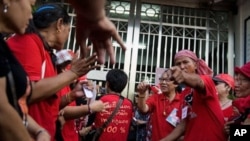A survey in Thailand by the United States-based Asia Foundation says greater decentralization of power is seen as a way to end the political polarization in the country.
The report also found that the degree of polarization was less extreme than has been reported by academics and the media.
The Asia Foundation survey, released Monday, found strong support for the decentralization of power as a way to easing the deep political tensions that have kept Thailand on a political rollercoaster for the past five years.
Decentralization, the survey reported, would improve governance and reduce political tensions,
Analysts say the Thai government administration has centered on the capital Bangkok, neglecting the political needs of rural communities where some 50 percent of the Thai population still lives.
In 2006 pro-nationalist so-called "Yellow Shirts" protests led to a coup and the ouster of former Prime Minister Thaksin Shinawatra from office. They again rallied once again in 2008 against the pro-Thaksin government that won at the polls in 2007.
Thaksin has won favor with the rural poor and urban working class with populist economic policies. But the middle class accused him of corruption and abuse of power.
Pro-Thaksin supporters responded by wearing the color red or "Red Shirts" and led counter-campaigns with street demonstrations in 2009 and again in 2010.
The military stepped in to end the protests last May after a political settlement collapsed and protests left more than 90 people dead.
The media and academics say the country is deeply divided between the two groups.
But the Asia Foundation's representative in Thailand, Kim McQuay, says the survey found 75 percent of those who responded were neutral with no support for either group.
"The dominant view has been that Thailand and the Thai polity is deeply divided. But what comes out from the survey that Thailand is not divided in quite the same way that there was a large, nearly three quarters of the respondent population expressed no color loyalty."
McQuay says instead, respondents showed strong support for political tolerance and democratic forms of government.
But Dr. Nongyao Nawarat from Chiang Mai University says both political groups support calls for a more democratic society.
"The political crisis between Red and Yellow [groups] is not as big as you could perceive from the media. So, we thought Red and Yellow - they are totally divided. But actually they’ve got some common ground. It iss so important for the Thai people to understand that both of them want the real democracy, want a better democracy, a better just society, " she says.
Phichai Rattanadulok na Phuket of the National Institute of Development Administration says the survey found that conflict generally lies between the core groups of the Yellow and Red Shirts.
But greater conflict could arise if the role of the Thai Monarchy is drawn into the debate. Thailand has had a constitutional monarchy since 1932.
The survey calls for the media to take a more active role in the political debate ahead of general elections likely in July. Analysts expect the vote to be hotly contested and unlikely to bring an end to the conflicts, as tensions re-emerge with parties vying to win political power.













